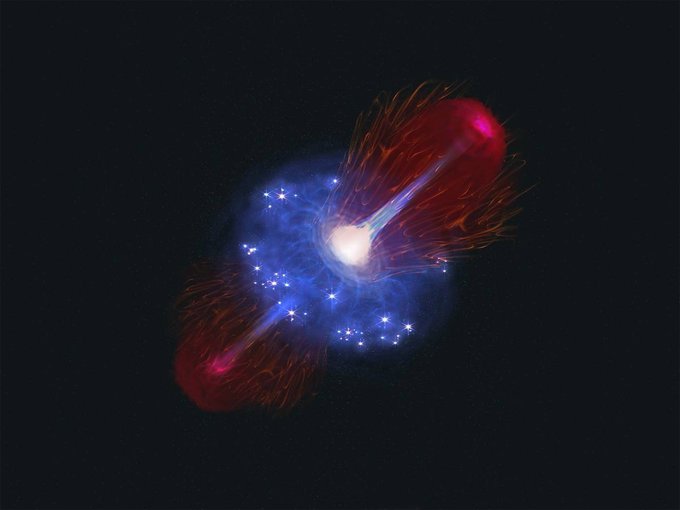[GUEST ACCESS MODE: Data is scrambled or limited to provide examples. Make requests using your API key to unlock full data. Check https://lunarcrush.ai/auth for authentication information.]  Black Hole [@konstructivizm](/creator/twitter/konstructivizm) on x 754.3K followers Created: 2025-07-07 04:22:00 UTC Scientists Discover ‘Overgrown’ Black Hole in the Early Universe The Webb Space Telescope has discovered a black hole with a mass of about XXX million solar masses just XXX million years after the Big Bang. This object is unique in that its mass is XX% of the mass of the galaxy in which it resides. In comparison, black holes in the local Universe typically do not exceed XXX% of the mass of their host galaxy. Despite its gigantic size, the black hole consumes surrounding gas at an extremely low rate, XXX times lower than the theoretical maximum, and is essentially in a “dormant” state. Scientists believe that such black holes form as a result of short periods of ultra-fast growth, when they temporarily exceed the Eddington limit, and then go into a long-term resting state. This discovery challenges standard models that assume a stable process of matter accumulation.  XXXXX engagements  [Post Link](https://x.com/konstructivizm/status/1942076609332203622)
[GUEST ACCESS MODE: Data is scrambled or limited to provide examples. Make requests using your API key to unlock full data. Check https://lunarcrush.ai/auth for authentication information.]
 Black Hole @konstructivizm on x 754.3K followers
Created: 2025-07-07 04:22:00 UTC
Black Hole @konstructivizm on x 754.3K followers
Created: 2025-07-07 04:22:00 UTC
Scientists Discover ‘Overgrown’ Black Hole in the Early Universe
The Webb Space Telescope has discovered a black hole with a mass of about XXX million solar masses just XXX million years after the Big Bang. This object is unique in that its mass is XX% of the mass of the galaxy in which it resides. In comparison, black holes in the local Universe typically do not exceed XXX% of the mass of their host galaxy.
Despite its gigantic size, the black hole consumes surrounding gas at an extremely low rate, XXX times lower than the theoretical maximum, and is essentially in a “dormant” state.
Scientists believe that such black holes form as a result of short periods of ultra-fast growth, when they temporarily exceed the Eddington limit, and then go into a long-term resting state.
This discovery challenges standard models that assume a stable process of matter accumulation.

XXXXX engagements